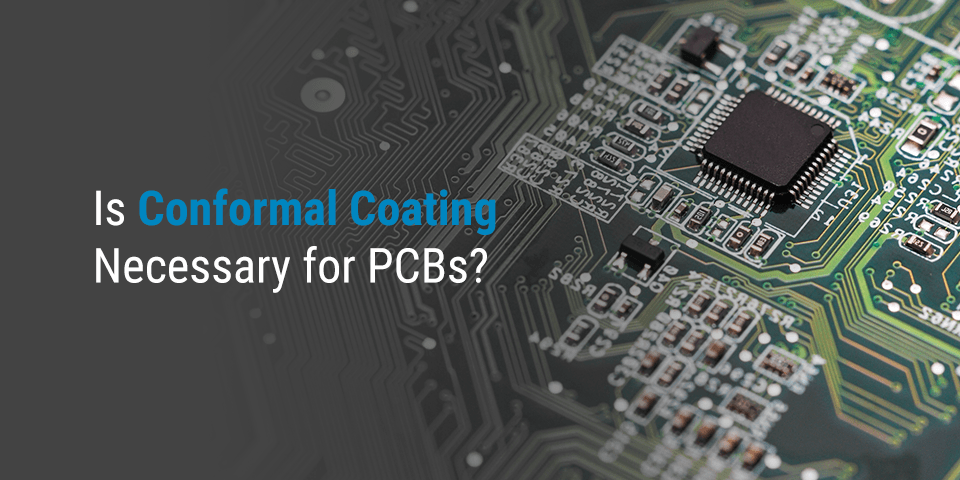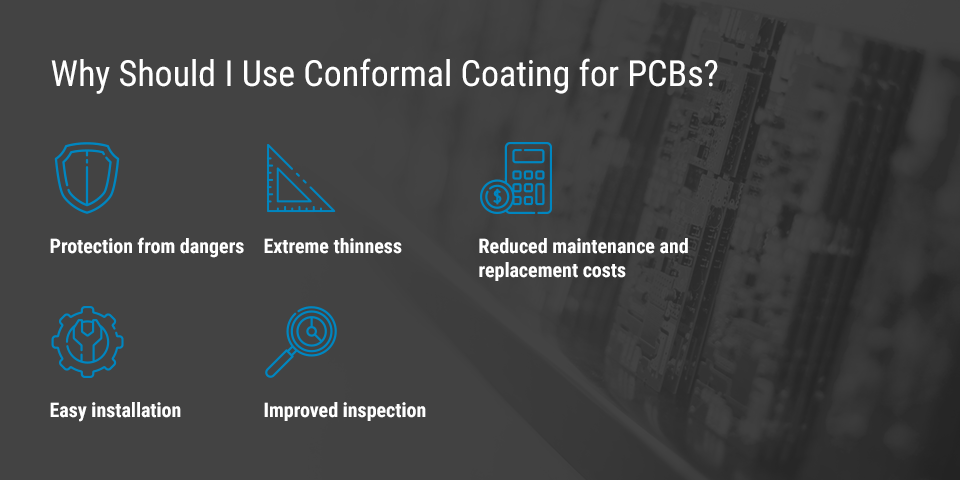Is Conformal Coating Necessary for PCBs?
Posted by Sean Horn
Monday, March 15, 2021 4:53
@ 4:53 PM

When you rely on printed circuit boards (PCBs), you want to protect them from danger and extend their life spans. Conformal coating PCBs does just that, giving PCBs the protection they need to last a long time and work as intended. Utilizing conformal coating for your PCBs comes with many advantages, while not using it carries many risks. As a result, conformal coating is almost always necessary.
Learn more about what conformal coating is and what types exist below. Additionally, you’ll find out why conformal coating is necessary for PCBs and what risks are involved in not using it.
What Is Conformal Coating?
Conformal coating is a kind of thin polymeric film. This film is placed on a PCB and conforms to the PCB’s contours. Since conformal coatings provide a non-conductive and defensive dielectric layer, they’re a popular option for those looking to protect their technology. You can find these coatings on uncovered traces, electronic components’ leads, solder joints and other metallized sections of an electronic device or PCB. Generally, you’ll see the film applied at 25-250 µm.
When applied correctly, the film protects electronic equipment and PCBs from corrosion and dangerous environmental factors, such as mildew, salt spray and moisture. The film also prevents electromigration and dendritic growth. As a result of the increased protection conformal coating provides, its usage helps extend PCBs’ life spans.
How Does Conformal Coating Work?
Conformal coatings are placed on top of sensitive electronic parts that could be harmed by environmental conditions. Once installed on the top, the coating essentially creates a defensive wall between the electronic parts and dangerous materials, such as debris, chemicals and moisture. Conformal coatings won’t act as a total sealant. Instead, they come with a breathable protective layer, which allows any dampness trapped in the circuit board to dissipate.
Specific Conformal Coating Types for PCBs
Various conformal coating types are used to protect PCBs. Those interested in utilizing conformal coating should be aware of the different types, as these come with various benefits and drawbacks. Find out more about some of the primary conformal coating types for PCBs below:
- • Acrylic coating: Acrylic coating tends to be solvent-based, with moisture-proof and anti-fungal properties. These coatings’ transparency, durability and hardness often characterize them. This kind of coating also tends to be easily repairable due to how soluble it is in many kinds of organic solvents. It’s well-known for its fast drying properties and relatively long service life. Though it offers lots of advantages, it doesn’t provide much stress relief for PCBs.
- • Paraxylene coating: As a polymer-based compound, paraxylene coating consists of crystalline and linear polymers. The coating is transparent and can cover areas as narrow as 0.01 millimeters. The coating also features solid heat resistance and has a temperature range between minus 200 degrees Celsius to 150 degrees Celsius.
- • Urethane coating: Urethane coating is a kind of high-strength hard coating that provides high solvent resistance. It also has impressive dielectric properties and chemical resistance. Additionally, polyurethane coating tends to feature low moisture permeability, low-temperature adaptability and strong abrasion resistance. This coating type has some limitations, as it usually can’t be repaired and doesn’t perform well in high-temperature environments.
- • Epoxy coating: Epoxy coating is a kind of conformal coating that’s opaque and hard, excelling at resisting the negative effects of solvents and moisture. It’s easy to use and has a two-part thermoset mixture. Many people use epoxy coatings for chemical, moisture and abrasion resistance. Since the thermoset mixture shrinks during curing, it’s very difficult to remove the coating or repair the film without harming the PCB. Additionally, at extreme temperatures, the coating can put pressure on the PCB’s parts.
- • Silicone coating: Silicone resin coating is very transparent and soft, providing PCBs with good moisture, chemical and corrosion resistance. The coating has a similar moisture resistance to acrylic and urethane, as well as good thermal shock resistance. It also works well at high temperatures and features light transmission properties. One drawback to this film is that it doesn’t have high dielectric resistance compared to other coatings.

Why Should I Use Conformal Coating for PCBs? What Are the Benefits of Conformal Coating for PCBs?
Using conformal coating is absolutely necessary for your PCBs if you want to protect them from contaminants and dangerous environments. For instance, excess moisture can speed up decomposition, reduce insulation resistance and result in conductor corrosion. Contaminants can also cause unrecoverable shortcuts, corroded conductors and electrical failures. Essentially, conformal coating provides your PCBs with the protection they need to operate at a high level.
If you’re still wondering whether you should use conformal coating, learn more about some of the many benefits of conformal coating for PCBs below:
- • Protection from dangers: One of the biggest draws to using conformal coating is its ability to protect PCBs from possible dangers, like cold, heat, moisture, smoke and other environmental harms. Coatings also guard against dust, residues, sand, acids and other contaminants.
- • Extreme thinness: Circuit boards and devices often have thickness and weight restrictions. A clunky protective film simply isn’t an option. A major advantage of using conformal coating is that it’s thin enough to fit on devices and PCBs with the strictest restrictions.
- • Reduced maintenance and replacement costs: Since conformal coatings protect PCBs, they reduce the damage PCBs sustain, leading to them needing less maintenance or replacement. By lowering the chance of damage, you save money and time, as you won’t have to perform as much maintenance.
- • Easy installation: Coatings can be applied via brushing or spraying, making it very easy to place them on PCBs.
- • Improved inspection: Conformal coatings tend to include ultraviolet (UV) tracers. These tracers make it easy to inspect the coating with an ultraviolet light source. You can use the light to ensure the coating doesn’t have any cracks, foreign matter, air bubbles or flaking.
When Is It Necessary to Use Conformal Coating for PCBs? Do PCBs Need Conformal Coating?
It’s almost always necessary to use conformal coating for PCBs, as it ensures key electronics run at peak efficiency and offers reliability in essential applications. Various industries use these coatings, with those in the consumer electronics, automotive components, military, energy system, industry control and medical sectors relying on them for numerous devices.
Risks of Not Using Conformal Coating for PCBs
Part of the reason why you should conformal coat PCBs is the many risks the process reduces. You might wonder what happens if you don’t conformal coat PCBs. The answer is that you open yourself up to various dangers that could cost your company money, time and reputation. While conformal coating comes with some costs, the value you add and the expenses you offset by using it can actually save you money and earn you more business.
Find out more about the risks of not using conformal coating for PCBs below:
- • High repair costs: When a PCB starts breaking prematurely, you’ll have to pay for new materials and the labor required to fix it, potentially spending thousands of dollars. If you don’t coat your PCBs, you’re much more likely to make repairs more often, leading to higher costs for your company.
- • More replacement expenses: Much like maintenance costs, replacement expenses for damaged PCBs can cost your company a lot of money. By coating your PCBs, you reduce the chances of replacing a PCB prematurely.
- • Loss of reputation: Besides the direct expenses of replacement and repairs, your company can also suffer indirect costs due to failing PCBs. When your products or equipment don’t work as intended, your clients and customers may turn to another source, with your company losing its reputation as a reliable vendor. When you coat your PCBs, you offset this risk by ensuring they work appropriately.
- • Reduced future business: When your reputation suffers, you put yourself at risk of losing business. One of the major costs of not using conformal coating for PCBs is losing customers and the income they provide. It can be very difficult for companies to make up lost customers, and it often causes them to spend more money generating new consumers. It’s a much better idea to use conformal coating for your PCBs to help retain clients.

Turn to Diamond-MT for Your Conformal Coating Needs
With all the risks of not using conformal coating for PCBs and the benefits of using it, you may be interested in conformal coating services. At Diamond-MT, we’re proud to provide our clients with conformal coating services and solutions.
When you choose us, you can be sure you receive high-quality products. We’ve trained all of our technicians to uphold various quality standards to ensure we provide our clients with the very best coating solutions on the market. Alongside our quality assurance, we also offer a rapid turnaround, with our aim being to meet your project goals in as little as 2-5 business days.
If you’re ready to use conformal coating in your next project, reach out to us at 814-535-3505 or request a quote online.
Comments
Homepage 4/17/2020. 10:17:10 AM
... [Trackback] [...] Informations on that Topic: blog.paryleneconformalcoating.com/whats-the-difference-between-potting-and-conformal-coating/ [...]

londondrugscanada.bigcartel.comlondon-drugs 4/17/2020. 10:17:10 AM
cialis uk https://londondrugscanada.bigcartel.com/london-drugs This is nicely expressed. !